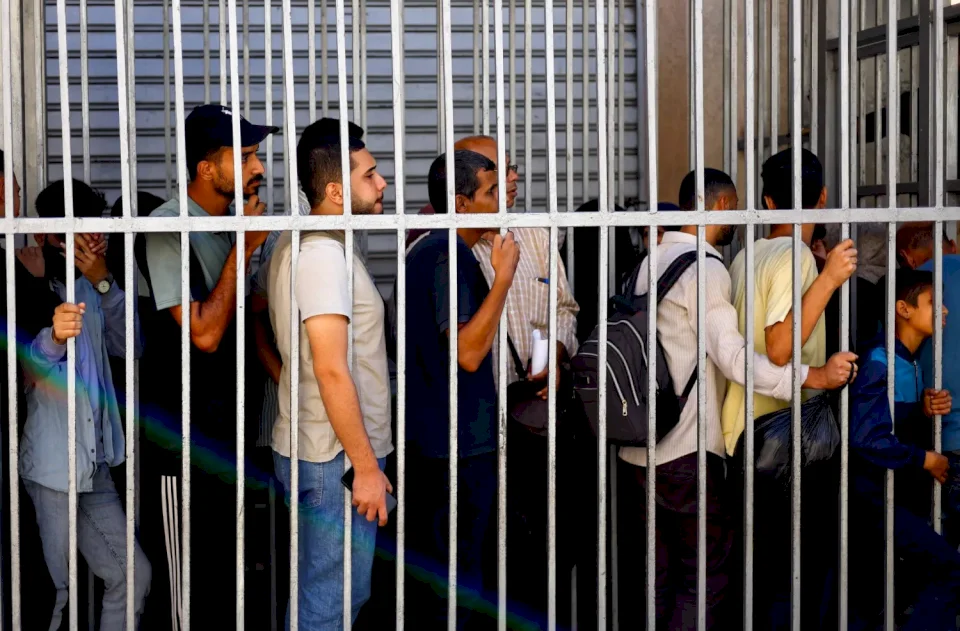
Banks in Gaza Without Funds... Residents of the Strip Prey to Exploitation
SadaNews Economy - The announcement of a ceasefire in Gaza has alleviated the shocks from Israeli airstrikes and the blockade, but the lack of cash liquidity has made Palestinians unable to spend their limited funds without becoming victims of those profiting from the tragic conditions, according to a report by Reuters.
Banks reopened their doors on October 16, six days after the ceasefire was announced. The two-year war has damaged many of them or completely destroyed them, similar to what happened to homes, schools, and other institutions across the Strip.
Long queues quickly formed outside banks, but people left disappointed.
Wail Abu Faris, 61, a father of six, said while standing next to "Bank of Palestine": "There is no money or liquidity in the bank. We just come and do the paperwork and leave."
The residents need cash to conduct most daily transactions in Gaza, whether to buy food from markets or to pay utility bills, but Israel has banned cash transfers along with the entry of most other goods following the attack led by Hamas in October 2023.
Huge Fees for Salary Disbursement
Economic expert in Gaza, Mohammad Abu Jiyab, told Reuters: "The banks are open and the air conditioning is working, but there are only electronic transactions; there are no deposits or withdrawals."
He added, "People still have to go to some greedy traders who take a huge commission ranging from 20 to 40 percent sometimes."
Iman Al-Jabri, a mother of seven, longs for a time when banking transactions would take less than an hour.
She says, "Today a transaction takes us 10 hours, if your turn even comes; you need two or three days going back and forth... in the end, you get 400 shekels or 500 shekels, and what will they get you with? Prices are very high today, we can't bear them."
For some Palestinians, the cash liquidity crisis has provided an opportunity to earn a living. Among them is Manal Al-Saidi, 40, who repairs damaged cash to cover some basic needs.
Al-Saidi said while examining the bills: "I work and make 20 or 30 shekels (six or nine dollars)... I go buy a loaf of bread or fava beans for dinner, falafel, anything simple... not that I can buy vegetables and other things, I can't... I manage by myself."
Some resort to electronic transfers via banking apps even when buying simple items like eggs or sugar, but vendors impose additional fees.
President Donald Trump's 20-point plan to end the war did not include the issue of bringing cash liquidity into Gaza and also left the details of reconstruction and security to be determined later.
The Israeli military unit coordinating government operations in the territories, which oversees the flow of aid into Gaza, has not yet responded to a request for comment on whether cash transfers will be allowed into the Strip and when.
The lack of cash and currency has exacerbated the crisis for the people of Gaza who have lost relatives, jobs, and homes, exhausted their savings, and sold belongings to buy food, tents, and medications. Some have resorted to bartering to manage their affairs.
For trader Samir Al-Namrouti, 53, it is no longer surprising to deal with banknotes that have lost their features from excessive circulation.
He said, "What matters to me is the serial number; as long as the serial number is present, that’s it, I deal with it as currency."

The Problem of Shekel Overcrowding Worsens.. Fuel Station Owners Threatened with Closure o...

The Palestinian Economy at a Crossroads: 4 Files Awaiting Resolution

Currency Exchange Rates Against the Shekel on Sunday (February 1)

Moody’s Changes Israel's Outlook from Negative to Stable

Currency Exchange Rates Against the Shekel (January 31)

Gold Falls Amid Bets on Tightening Monetary Policy

Revealing the Travel Costs of the Israeli Minister of Economy for 2025
